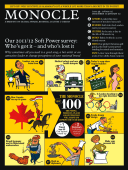
Issue 49
Monocle issue 49 is our bumper double edition – our biggest yet.
In This Issue
Oops! No content was found.
Looks like we no longer have content for the page you're on. Perhaps try a search?
Return Home
Daily inbox intelligence from Monocle

Monocle issue 49 is our bumper double edition – our biggest yet.
Looks like we no longer have content for the page you're on. Perhaps try a search?
Return Home